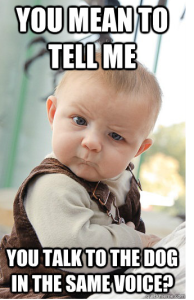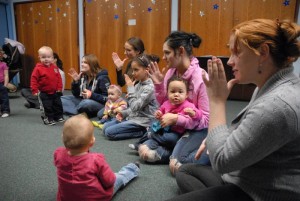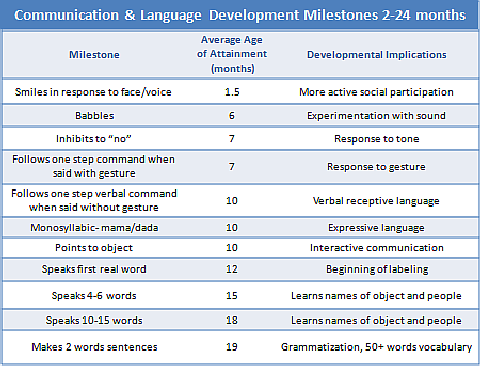Language Development in Children: 3 False Facts
As with most things, there are common misconceptions about speech and language development in children, undoubtedly confusing all of us parents! Should we be reading the Wall Street Journal to our babies in utero? Should we feel self-conscious when engaging in baby talk with our 6 month old? Are we doing damage? We are here to help clarify some of the most common False Facts about language development in your child. Of course, it’s important that you are patient. All parents can’t wait until that day when their baby begins to talk! BUT, each child progresses at a different rate, so be patient, it will come. Your best bet is to understand what is true and what is false about language development in your child.
False Fact 1: No Words by Age 1 Means RED FLAG!
Many parents raise the red flag if their child has not spoken a single, clear word by the age of one. However, most children actually say their first words between the ages of 12 and 18 months AND, often times those words are still a bit unintelligible. Do not be alarmed if you haven’t heard a “mommy” or “daddy” at her first birthday. Sure, it’s hard not to compare when your next door neighbor’s child seems to be speaking in full sentences at 13 months. All children develop their speech and language skills at different rates. It would be time to raise the red flag however, when your child has yet to speak a word by 18 months and 2 years old. Or, if your child has been using words and suddenly stops talking by this age, or his language skills fail to increase or expand.
Does “ba ba” and “da da” count? You bet! The words do not have to be completely accurate or even completely clear to be considered as speaking words. If you are concerned, Parenting Magazine has a very simple yet useful timeline of baby language development from birth to 15 months.
False Fact 2: Using Baby Talk Slows Down Language Development

Does Baby Talk Accelerate Language Development? Image courtesy of theviewfromadrawbridge.wordpress.com
We’ve all heard that baby talk slows language development, instead we should be chatting “adult-style” to our newborns. What do they mean exactly by Baby Talk? According to Lauren Lowrey, Hanen Certified Speech Language Pathologist, baby talk or motherese,
has a higher-than-normal and more varied pitch, a slower rate of speaking, simpler vocabulary, lots of repetition, emphasis of important words, and exaggerated, positive facial expression.
Think a smiling mommy asking her baby, “Are you weddy for breffy?” instead of “Are you ready for breakfast?”
Any type of engagement with your young children is beneficial, and some studies have shown that babies actually react well to baby talk from parents. It can help them to focus in on your speech patterns, especially amidst background noise. If your child is using baby talk to converse with you, don’t worry about correcting the word right away. In time, your baby will be able to discern what is the “baby” version of the real word. However, as your child starts to build his vocabulary and has a few words and phrases under his belt, try to model proper language pronunciation when you can. For example, if your son says “baba” for bottle, you can respond with “Do you want your bottle?” Generally, around the age of three, you can begin to work with your child to stop using baby talk all together, and instead work on the proper names for the things around him.
False Fact 3: Sign Language Speeds Up Language Development
Sign Language is used by many parents as a way to communicate with a child before he or she is able to talk. It has been rumored to actually help babies and toddlers learn to talk faster than normal rates, by increasing vocabulary before he or she learns to speak the words. The truth? Using sign language does not translate to accelerated language acquisition for children. According to a study from the University of Hertfordshire in England, Dr Liz Kirk found:
Although babies learned the gestures and used them to communicate long before they started talking, they did not learn the associated words any quicker than the non-gesturing babies, nor did they did they show enhanced language development.

Child Sign Language – Accelerate Language Development? True or False? Image source: rochester.kidsoutandabout.com
Although signing was not found to accelerate language development, children who learn simple sign language skills are able to express themselves better even before they learn to speak. This results in reduced frustration for your child (and for you) as he learns to communicate. Similarly, Dr. Kirk’s study indicated that mothers who gestured with their babies were more responsive to their babies’ non-verbal clues.
Of course, there are plenty of time-tested, proven activities and resources that you as a parent can try with your children to improve language skills. Reading with your child, spending time with online language-building sites or even just paying attention to recommended language development milestones are all beneficial for your child. Most importantly however, be patient. You know your child best! Don’t accept false facts about your child’s language development. In time, your child will be asking your opinion about the 2016 election candidates – you better be ready!




